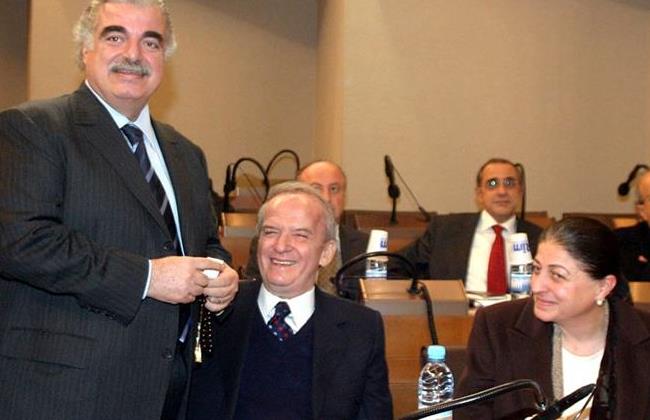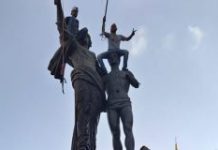STL: Hariri spooked night before assassination
Elise KnutsenHashem Osseiran/The Daily Star/Jan. 21, 2015
THE HAGUE/BEIRUT: Less than 24 hours before his assassination, the usually unflappable former Prime Minister Rafik Hariri was noticeably disturbed by a news report suggesting Syria might be plotting to assassinate him and other senior Lebanese politicians, the Special Tribunal for Lebanon heard Tuesday.
In his third hearing, former MP Ghattas Khoury told the Hague-based tribunal that that he and former Minister Basil Fuleihan met with Hariri at Qoreitem Palace Feb. 13, 2005 – the eve of his assassination – and were struck by his unusually “upset” response to a report in pan-Arab daily Al-Hayat about credible threats of impending bloodshed in Lebanon.
According to the report, “well-informed European sources” told Al-Hayat the international community had issued “a clear message to Syria,” warning that if “Walid Jumblatt or [Rafik] Hariri were subject to any assassination attempt then that would serve as the final breaking point between Syria and the international community.”While Hariri received threats “on a daily basis,” Khoury said the former premier seemed shaken this time.
He was “upset, disturbed, as if he took it [the news] very seriously,” Khoury told the tribunal. “The prime minister used to always say that any attempt on his life is something they will never dare to do,” Khoury continued. “In this particular instance he did not give his usual answer … He said he would make a few phone calls.”When Hariri asked about the source of the information, Fuleihan reportedly told him he had heard “it might have been [from] British intelligence based on [wire] tapping in Cyprus,” where they were intercepting Syrian communications, he said.
Khoury’s testimony is part of the “political evidence” being presented before the U.N.-backed tribunal tasked with prosecuting those responsible for killing Hariri and 21 others, including Fuleihan, in a massive bombing nearly 10 years ago. Fuleihan died from his injuries two months after the attack. And that was not the only indication on the evening of Feb. 13 that something was amiss, Khoury said. Earlier that day, the head of Hariri’s security detail, Yehaya al-Arab, known as Abu Tareq, had a meeting with Rustom Ghazaleh, a top Syrian intelligence officer based in Lebanon.
Ghazaleh unleashed a “string insults” about Hariri and threatened Abu Tareq, according to Khoury, by saying, “If you were not my friend I wouldn’t have allowed you to return to your home today.” Abu Tareq was uncharacteristically alarmed by the encounter, Khoury said. He died the following day in the explosion alongside Hariri. Khoury further testified that at the time of Hariri’s assassination, not a single Lebanese security agency was outside of Syria’s influence. “The Lebanese security agencies were implementing the direct orders of the president of the [Lebanese] republic and of the republic of Syria,” he said.
Khoury also discussed a meeting that took place between various politicians opposed to Syria’s hegemony in Lebanon in the Bristol Hotel Feb. 2, 2005, just two weeks before Hariri’s assassination. According to the former MP, the meeting was attended by Fuleihan, Khoury and Future Movement MP Ahmad Fatfat, and was noticeably different to the previous two sessions held at the same hotel.
“The meeting confirmed that we had completely moved to the opposition,” Khoury said, in reference to a call for the total withdrawal of Syrian troops from Lebanon.
It was also the first time that Hariri’s representatives increased their presence and marked themselves out “as a bloc and not as individuals,” Khoury said, explaining that close allies of the former premier who hadn’t attended previous sessions were suddenly there.
“The third Bristol meeting gathered the largest opposition number and there was a clear presence for Hariri’s bloc,” he said. Khoury proceeded to speak about the day of Hariri’s assassination, saying that he and Fuleihan went to see the former prime minister in the nearby L’Etoile Café in Downtown Beirut and found him surrounded by a group of reporters.
Recalling his last conversation with the premier, Khoury said the two discussed the Beirut Association for Social Development’s distribution of olive oil to residents in pertinent electoral districts ahead of the 2005 parliamentary elections. The move was seen by Hariri’s opponents as an attempt to bribe his constituency before the polls, and the opposition wanted to arrange a meeting to tell him so in person, Khoury said.
Khoury before STL: Fleihan Spoke of Real Threat to Hariri’s Life Days before Assassination
Naharnet 20.01.15 /Former MP Ghattas Khoury concluded on Tuesday his testimony before the Prosecution at the Special Tribunal for Lebanon, recounting the details of events that took place days before the assassination of former Prime Minister Rafik Hariri on February 14, 2005.
He revealed that slain Minister Bassel Fleihan had warned the premier that there were serious threats against his life. “Fleihan said that the lives of former PM Hariri and MP Walid Jumblat were at risk. These claims were made in an article in al-Hayat newspaper,” he added.
“It was the first time he took such threats seriously,” Khoury told the court. Fleihan explained that the al-Hayat article may have based its information on British intelligence that may have been spying on Syrian intelligence agencies.
Hariri said that he will take these threats into consideration and carry out the necessary contacts to inquire about them, added Khoury. He noted however that “Hariri had told me that Arab and foreign officials had advised the Syrian regime to avoid resorting to assassinations in Lebanon in the wake of the attempt against MP Marwan Hamadeh’s life in October 2004.”
“Given the grip the Syrian-Lebanese security apparatus had over Lebanon, an assassination attempt could not have been possible without its knowledge,” he explained. The security agencies controlling Lebanon at the time were tapping the telephones of opposition figures, harassing student activists, and exerting other forms of pressure, said the former lawmaker. “Hariri had repeatedly complained that the Lebanese security agencies were violating the law,” he revealed. Khoury then spoke of the media campaign and pressure exerted by the Lebanese-Syrian security apparatus days before Hariri’s murder. The latest media campaign was focused on the former premier’s distribution of olive oil on families in Beirut.
Hariri had come under attack for his efforts even though it was a practice he had adopted for some seven years, he remarked. On the day of the assassination, continued Khoury, Hariri was attending a parliament session, which was expected to tackle the parliamentary electoral law. The former prime minister then realized that the meeting would not be addressing this issue, prompting him to exit the building and head to a nearby cafe, he recounted. Hariri would have returned to parliament on February 14 had it been planning to discuss the electoral law, noted Khoury. “I met with him briefly and then headed to my work at the American University of Beirut Medical Center,” he stated. “Soon after arriving at the hospital, I heard the assassination blast. I headed outdoors and witnessed the smoke caused by the explosion. I sensed that Hariri may have been the target,” he revealed. An emotional Khoury then told the court that the bodies of the blast victims soon began arriving at AUBMC. He identified Hariri’s corpse and then saw Fleihan, who was in the premier’s convoy, being treated for his injuries. The Prosecution then concluded its cross-examination of Khoury and the Defense then began its questioning. The session was then adjourned to Wednesday.
Fleihan passed away in April 2005 from the injuries he sustained in Hariri’s assassination. The STL is tackling the February 2005 assassination of Hariri and 22 others in a major bombing in Beirut. It is currently listening to the testimonies of a number of witnesses who were close to Hariri in the months preceding the assassination. Hamadeh gave his testimony in late 2014 and journalist Faisal Salman gave his testimony at the resumption of the hearings in 2015. Khoury’s testimony will be followed by witness Salim Diab on January 22 and 23.















